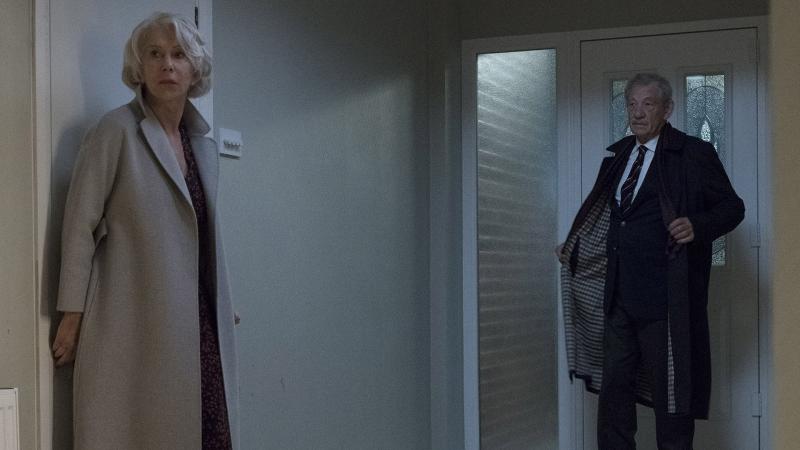The Good Liar review - the grey pound dipped in acid | reviews, news & interviews
The Good Liar review - the grey pound dipped in acid
The Good Liar review - the grey pound dipped in acid
McKellen and Mirren play dark conman games in an uncompromising thriller

Ian McKellen, his Mr Holmes director Bill Condon and Helen Mirren play clever, nasty games with conman clichés and presumptions about the elderly in this sometimes absurdly twisty thriller.
McKellen’s Roy Courtnay is an irascible, whiskery cad, Mirren’s Betty McLeish the trusting, rich widow he entraps. His slow courting of her in her genteel, suburban estate home is only part of a wide portfolio of dishonesty, aided by his avuncular partner in crime Vincent (Jim Carter), a fake lawyer ever ready with dummy investment papers, whether enticing a widow over cream teas, or luring a businessman with oligarch rubles at Stringfellow’s.
Roy’s scams make him mask his cunning and vitality, adopting a limp as he turns the corner to meet Betty, then shucking his old mac to gratefully saunter in a pin-stripe towards more amenable City prey. He numbs Betty with the anodyne drip of clichés, then excites investors with inflated pipedreams. Condon has great fun with this constant doubling and deceit, which approaches Whitehall farce in its quick-change requirements. Mirren similarly damps down her natural acuteness as a successful but unworldly academic.
 Condon’s overhead camera sees the precisely planned outline of Betty’s suburb as crop circle-weird. Its bungalows, privet hedges and wheezing, well-meaning joggers seem equally alien to Roy, peering from the necessary purgatory of his prey’s neat garden with a rheumy sneer. Condon also skims through grey London and Berlin locations with the outsiders’ eye cast on rural Sussex in Mr. Holmes. Mostly, though, he relies on his stars’ still magnetic faces for visual allure. Mirren manages to be clever, foolable and sphinx-like, while McKellen relishes the revelation that age hasn’t withered Roy’s essence as a wholly nasty piece of work.
Condon’s overhead camera sees the precisely planned outline of Betty’s suburb as crop circle-weird. Its bungalows, privet hedges and wheezing, well-meaning joggers seem equally alien to Roy, peering from the necessary purgatory of his prey’s neat garden with a rheumy sneer. Condon also skims through grey London and Berlin locations with the outsiders’ eye cast on rural Sussex in Mr. Holmes. Mostly, though, he relies on his stars’ still magnetic faces for visual allure. Mirren manages to be clever, foolable and sphinx-like, while McKellen relishes the revelation that age hasn’t withered Roy’s essence as a wholly nasty piece of work.
Condon and McKellen have been good for each other, making their Hollywood breakthrough together with the actor’s Oscar-nominated turn as Frankenstein’s gay director James Whale in Gods and Monsters (1998), and reconnecting after enormous mainstream success (Dreamgirls and Twilight for the director, Gandalf and X-men for his star) in Mr. Holmes’ vision of a Sherlock living long enough to investigate atom bombs, and Alzheimer’s.
Roy Courtnay is another uncompromised role for the now octogenarian McKellen. Far from Hollywood fantasies of conmen as playful rogues, he’s a merciless, veteran life-wrecker. This is Terry-Thomas as Jack the Ripper, as ready to ransack a gullible woman’s account as offer her his arm on a date (in another wrong-footing feint, Inglorious Basterds’ anti-Nazi ultra-violence provides our pensioners’ night at the pictures).
Wartime flashbacks offer a bigger story, making this a film about the betrayal and restoration of adolescent hope, as well as livid, life-long cruelties. But as plot cogs slam into revelatory place, The Good Liar’s novelistic source becomes clear, stretching credibility which previously rested on ambiguity and character. Condon’s repeated dipping of the grey pound in acid remains a bracing achievement.
The future of Arts Journalism
You can stop theartsdesk.com closing!
We urgently need financing to survive. Our fundraising drive has thus far raised £49,000 but we need to reach £100,000 or we will be forced to close. Please contribute here: https://gofund.me/c3f6033d
And if you can forward this information to anyone who might assist, we’d be grateful.

Subscribe to theartsdesk.com
Thank you for continuing to read our work on theartsdesk.com. For unlimited access to every article in its entirety, including our archive of more than 15,000 pieces, we're asking for £5 per month or £40 per year. We feel it's a very good deal, and hope you do too.
To take a subscription now simply click here.
And if you're looking for that extra gift for a friend or family member, why not treat them to a theartsdesk.com gift subscription?
more Film
 London Film Festival - from paranoia in Brazil and Iran, to light relief in New York and Tuscany
'Jay Kelly' disappoints, 'It Was Just an Accident' doesn't
London Film Festival - from paranoia in Brazil and Iran, to light relief in New York and Tuscany
'Jay Kelly' disappoints, 'It Was Just an Accident' doesn't
 Iron Ladies review - working-class heroines of the Miners' Strike
Documentary salutes the staunch women who fought Thatcher's pit closures
Iron Ladies review - working-class heroines of the Miners' Strike
Documentary salutes the staunch women who fought Thatcher's pit closures
 Blu-ray: The Man in the White Suit
Ealing Studios' prescient black comedy, as sharp as ever
Blu-ray: The Man in the White Suit
Ealing Studios' prescient black comedy, as sharp as ever
 The Woman in Cabin 10 review - Scandi noir meets Agatha Christie on a superyacht
Reason goes overboard on a seagoing mystery thriller
The Woman in Cabin 10 review - Scandi noir meets Agatha Christie on a superyacht
Reason goes overboard on a seagoing mystery thriller
 London Film Festival 2025 - crime, punishment, pop stars and shrinks
Daniel Craig investigates, Jodie Foster speaks French and Colin Farrell has a gambling habit
London Film Festival 2025 - crime, punishment, pop stars and shrinks
Daniel Craig investigates, Jodie Foster speaks French and Colin Farrell has a gambling habit
 I Swear review - taking stock of Tourette's
A sharp and moving tale of cuss-words and tics
I Swear review - taking stock of Tourette's
A sharp and moving tale of cuss-words and tics
 A House of Dynamite review - the final countdown
Kathryn Bigelow's cautionary tale sets the nuclear clock ticking again
A House of Dynamite review - the final countdown
Kathryn Bigelow's cautionary tale sets the nuclear clock ticking again
 theartsdesk Q&A: Idris Elba on playing a US President faced with a missile crisis in 'A House of Dynamite'
The star talks about Presidential decision-making when millions of lives are imperilled
theartsdesk Q&A: Idris Elba on playing a US President faced with a missile crisis in 'A House of Dynamite'
The star talks about Presidential decision-making when millions of lives are imperilled
 Urchin review - superb homeless drama
Frank Dillane gives a star-making turn in Harris Dickinson’s impressive directorial debut
Urchin review - superb homeless drama
Frank Dillane gives a star-making turn in Harris Dickinson’s impressive directorial debut
 Mr Blake at Your Service review - John Malkovich in unlikely role as an English butler
Weird comedy directed by novelist Gilles Legardinier
Mr Blake at Your Service review - John Malkovich in unlikely role as an English butler
Weird comedy directed by novelist Gilles Legardinier
 Don't Let's Go to the Dogs Tonight review - vivid adaptation of a memoir about a Rhodesian childhood
Embeth Davidtz delivers an impressive directing debut and an exceptional child star
Don't Let's Go to the Dogs Tonight review - vivid adaptation of a memoir about a Rhodesian childhood
Embeth Davidtz delivers an impressive directing debut and an exceptional child star

Add comment